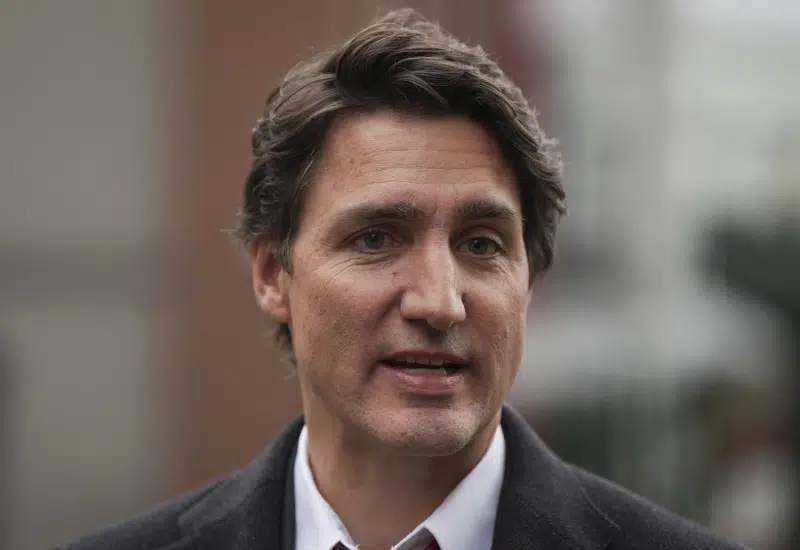By David Alire Garcia, Trevor Hunnicutt and David Ljunggren
U.S. President Donald Trump backed away from his threat to impose steep tariffs on Mexico and Canada on Monday, leaders of those countries said, but U.S. tariffs on China were still due to take effect within hours.
Both Canadian Prime Minister Justin Trudeau and Mexican President Claudia Sheinbaum said they had agreed to bolster border enforcement efforts in response to Trump’s demand to crack down on immigration and drug smuggling. That would pause 25% tariffs due to take effect on Tuesday for 30 days, both leaders said.
Trudeau said Canada would deploy new technology and personnel along its border with the United States to stop the flow of fentanyl. There was no immediate confirmation from the White House, but Trump told reporters that a phone call with Trudeau went “very well.”
Mexico agreed to reinforce its northern border with 10,000 National Guard members to stem the flow of illegal migration and drugs.
The agreement also includes a U.S. commitment to prevent trafficking of high-powered weapons to Mexico, Mexican President Claudia Sheinbaum said on X. The two leaders spoke by phone on Monday, just hours before U.S. tariffs on Mexico, China and Canada were set to take effect. Economists say the steep levies would cause widespread economic harm, including increased prices for U.S. businesses and consumers.
The U.S. and Mexico will use the month-long suspension to engage in further negotiations, Trump said on social media.
“I look forward to participating in those negotiations, with President Sheinbaum, as we attempt to achieve a ‘deal’ between our two Countries,” he wrote on Truth Social.
“We have this month to work and convince each other that this is the best way forward,” Sheinbaum said at a press conference.
The agreement came less than 48 hours after Trump announced sweeping tariffs on goods from the top three U.S. trading partners, accounting for $2.1 trillion of annual commerce. The about-face was emblematic of the often chaotic nature of the early days of his second presidency.
Trump warned on Monday he might increase tariffs on Beijing beyond the 10% he imposed and that he would discuss the matter with the Chinese government’s leadership in the next day or so.
“China hopefully is going to stop sending us fentanyl, and if they’re not, the tariffs are going to go substantially higher,” he said.
The tariffs on China remain poised to begin at 12:01 a.m. on Tuesday (0501 GMT Wednesday).
The latest twist in the saga sent the Canadian dollar soaring after slumping to its lowest in more than two decades. The news also gave U.S. stock index futures a lift after a day of losses on Wall Street.
EU NEXT TARGET?
Trump suggested on Sunday the 27-nation European Union would be his next target, but did not say when.
“They don’t take our cars, they don’t take our farm products. They take almost nothing and we take everything from them,” he told reporters.
EU leaders at an informal summit in Brussels on Monday said Europe would be prepared to fight back if the U.S. imposes tariffs, but also called for reason and negotiation. The U.S. is the EU’s largest trade and investment partner.
Trump hinted that Britain, which left the EU in 2020, might be spared tariffs, saying: “I think that one can be worked out”.
Trump, who acknowledged over the weekend that the tariffs could cause some short-term pain for U.S. consumers, nevertheless has argued the tariffs are needed to curb immigration and narcotics trafficking and spur domestic industries.
Trump’s tariffs would cover almost half of all U.S. imports and would require the United States to more than double its own manufacturing output to cover the gap – an unfeasible task in the near term, ING analysts wrote.
Other analysts said the tariffs could throw Canada and Mexico into recession and trigger “stagflation” – high inflation, stagnant growth and elevated unemployment – at home.
China called fentanyl America’s problem and said it would challenge the tariffs at the World Trade Organization and take other countermeasures, but also left the door open for talks.
Reuters

